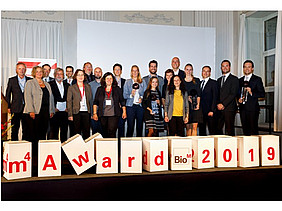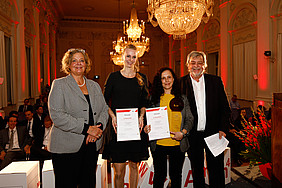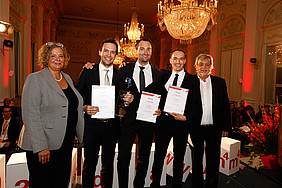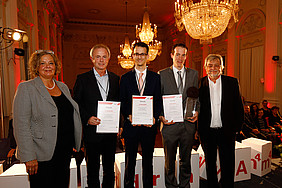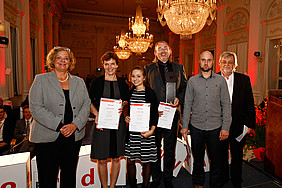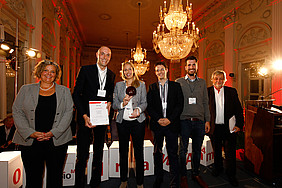Bavaria sets impulses for the medicine of the future
The pre-seed competition m4 Award announces winners
- m4 Award winners announced at the 2nd BioEntrepreneurship Summit 2019.
- The Bavarian pre-seed competition m4 Award supports startups in precision medicine - the medicine of the future.
- Oncology and antibiotic resistance are the winner-topics of this year's competition.
- 2.5 million euros in funding for innovative projects to develop new drugs against diseases with a high medical need.
The Bavarian State Ministry of Economic Affairs, Regional Development and Energy today announced the five winners of this year's m4 Award pre-seed competition at the startup event BioEntrepreneurship Summit 2019. Each winning team will receive up to 500,000 euros for two years. The ceremony took place in the Munich Residence (Picture Gallery m4 Award 2019 and BioEntrepreneurship Summit 2019).
Three teams of the selected research groups are developing novel therapies against different forms of cancer to achieve targeted, effective and well-tolerated treatment. With their projects, two of the research groups address the urgent medical need in the field of antibiotic resistance. All winning teams are conducting research in Munich, four at the Technical University of Munich and one at the Ludwig-Maximilians-Universität München. More than 30 top-class applications were received from academic institutions throughout Bavaria.
With prize money of up to 500,000 euros for two years, the competition supports the further development and validation of the respective project idea in order to set up a spin-off. The scientists not only receive financial support but also active support from BioM and other partners as well as industry experts.
State Secretary Roland Weigert emphasized in his video message:
"Biotechnology is a key technology of the 21st century and enables the development of innovative therapies. This 'medicine of the future' is increasingly being developed not only in large industrial companies but primarily in life science startups. This is why the Bavarian State Government supports startups in biotechnology with a targeted set of tools."
Weigert wished the winners lots of success for the future and hopes that the award-winning projects, supported by the Bavarian State Government, will result in additional highly innovative biotech companies in Bavaria.
At the award ceremony Dr. Ulrike Wolf, department head of the Bavarian State Ministry of Economic Affairs, joined Weigert in his good wishes.
Prof. Horst Domdey, Managing Director of BioM, is convinced of the continued success of the selected teams:
"The topics of the award-winning projects have great potential to create innovative therapies. Bavaria has thus repeatedly shown itself to be a stimulating location for the medicine of the future."
With the m4 Award, initiated in 2011 by BioM, the network organization of the biotechnology industry in Munich and Bavaria, the Bavarian State Government promotes innovative products, technologies or services of young companies that decisively advance the further development of the medicine of the future. The prize is awarded every second year.
The winners of the m4 Award 2019
PD Dr. Jennifer Altomonte
Teresa Krabbe
Klinikum rechts der Isar, Technical University of Munich
Commercialization of oncolytic viruses (FUSIX Biotech)
Oncolytic viruses (OVs) now claim a steadily growing market share in cancer therapeutics. These viruses offer an elegant and multimodal mode of action that enables a long-lasting systemic therapeutic success. Despite great progress, oncolytic viruses still face some obstacles in aggressive solid tumors and in reaching the tumor during intravenous application. FUSIX Biotech addresses these and other problems with a novel proprietary hybrid virus technology. Based on cell-cell fusion reactions, both the infection of healthy cells and the release of new virus particles from infected cells into the surrounding tissue are reduced, resulting in a special safety profile. With this funding, the team hopes to enable the preclinical development of its lead product.
Dr. Benjamin Kick
Dr. Klaus Wagenbauer
Dr. Jonas Funke
Technical University of Munich
Development of a nanoswitch for antibodies (LOGIBODY)
Antibody-based immunotherapies have great potential for the treatment of tumor diseases. However, an over-stimulation of the immune system can lead to side effects that require the therapy to be discontinued. This overstimulation has two causes: First, the target antigens are often present both on the tumor tissue and on the healthy tissue. Secondly, the antibodies are active throughout the body and not only locally on the tumor. In order to solve these problems, the team and its mentor Prof. Dietz have developed an "on/off button" for antibody immunotherapies. This is an ultra-miniaturised nanoswitch made of DNA. The nanoswitch can specifically recognize tumor cells and recruit the body's own immune cells to fight these cells. This enables the immune system to fight tumor cells in a targeted and "on demand" manner and leads to lower activity on healthy tissue and thus to fewer side effects. In the medium term, the LOGIBODY platform will be used in cooperation with pharmaceutical companies to develop therapeutics against various tumor diseases. If the technology is successfully validated, LOGIBODY's own therapies are planned in the long term. LOGIBODY is an example of the innovative potential of molecular robotics.
Prof. Dr. Sebastian Kobold
Bruno Cadilha
Prof. Dr. Stefan Endres
Hospital of the Ludwig-Maximilians-Universität München
Development of a T-cell therapy platform to protect chimeric antigen receptor (CAR) T-cells and other cell therapeutic procedures from suppression and to apply regulatory mechanisms for function amplification (CARMOUFLAGE)
The use of chimeric antigen receptor (CAR) T cells has been established in the treatment of some leukemias and lymphomas. In contrast, CAR-T cells are not effective in solid tumors due to tumor-associated immunosuppression and insufficient access of T cells to tumor cells. The research team led by Dr. Sebastian Kobold therefore developed the CARMOUFLAGE platform to enable the access of CAR-T cells to tumor tissue. At the same time, a receptor protecting against immunosuppression increases the cytotoxic activity of CAR-T cells. The funding is intended to confirm the effect of CARMOUFLAGE and to demonstrate the therapeutic safety of the approach.
Dr. Hannelore Meyer
Julia Krämer
Dr. Grzegorz Popowicz
Dr. Krzysztof Zak
Technical University of Munich
Development of novel antibiotics for the treatment of infections with multi-resistant Gram-negative bacteria (FRAgment based antiBIOTICS - FRABIOTICS)
Infections with multi-resistant bacterial pathogens represent one of the greatest medical challenges of the future. Using its own screening platform, the research team was able to identify two novel fragment classes as inhibitors of bacterial resistance against the most important antibiotic class, the β-lactame-antibiotics. The combination of active inhibition of all β-lactamase classes with an independent antibacterial effect opens up the possibility of developing a drug with a double mode-of-action and thus making new resistance development considerably more difficult. Within the m4 Award, the inhibitors are to be further optimized with regard to their antibacterial effect.
Prof. Dr. Stephan Sieber
Dr. Franziska Mandl
Dr. Mathias W. Hackl
Dr. Christian Fetzer
Technical University of Munich
Preclinical development of a resistance-free antibiotic for the treatment of fatal infectious diseases (aBACTER)
Bacterial infectious diseases caused by multi-resistant organisms such as multi-resistant Staphylococcus aureus (MRSA) pose one of the greatest dangers to our health. The project team around Prof. Dr. Stephan Sieber has discovered a new antibiotic, which is very effective against gram-positive, multi-resistant bacterial strains and shows no development of resistance. The new mode of action differs fundamentally from that of all previously approved antibiotics. The primary goal of the aBACTER project is the development of a new antibiotic against endocarditis, an inflammation of the inner lining of the heart that is already very difficult to treat.

